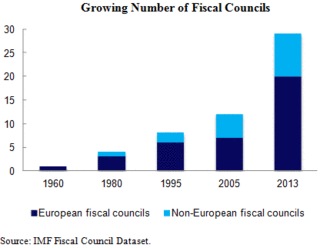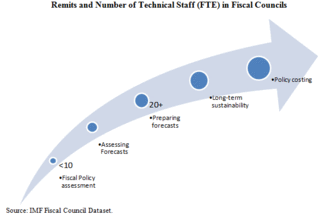Posted by Xavier Debrun and Tidiane Kinda
The fiscal legacy of the 2008-09 economic and financial crisis has shaken the credibility of governments’ commitment to sustainable public finances. Because of their potential role in restoring fiscal credibility and increasing transparency, a new breed of institution (“fiscal councils”) has come to the forefront of the policy debate.
Fiscal councils are independent public institutions aimed at promoting sound fiscal policies through a better informed public debate and greater transparency. To that end, the councils carry out various functions, including public assessment of fiscal plans and performance, the monitoring of compliance with numerical fiscal rules, and the evaluation or preparation of macroeconomic and budgetary forecasts. These activities contribute to raising the reputational and electoral costs of undesirable policies and broken commitments, which enhances the credibility of fiscal policy.In a recently published paper “Strengthening Post-Crisis Fiscal Credibility—Fiscal Councils on the Rise. A New Dataset”, Xavier Debrun and Tidiane Kinda review 29 institutions identified as fiscal councils across IMF member states.1 The paper documents key characteristics of fiscal councils in a new dataset, and presents preliminary evidence on their effectiveness. Information in the dataset includes fiscal councils’ governance structure (independence, composition, size, term length for high-level staff, etc.); their remits (preparation of budgetary forecasts, monitoring of fiscal rules, costing of fiscal measures, long-term fiscal sustainability analysis, etc.) as well as their main channels of influence (publication of reports, access to the media, formal consultations with parliament, etc.).
Fiscal councils on the rise
A brief glance at the new dataset reveals a growing interest in fiscal councils, particularly since the recent crisis. From only one such body in 1960—the Netherlands Bureau for Economic Policy Analysis, also known as the Central Planning Bureau—the number of councils has surged since the 2008-09 crisis, reaching 29 by the end of January 2013 (see chart below). Recently established fiscal councils include the Parliamentary Budget Offices in Canada and South Africa, the Office for Budget Responsibility in the United Kingdom, and the High Council of Public Finance in France. Although most established fiscal councils are located in advanced economies, particularly in Europe, there is growing interest in emerging markets and developing economies.2
The datasetreveals that existing councils cover a wide variety of possible institutional forms and differ greatly in terms of size, remits and tasks. Most of the existing institutions are either attached to the
legislature (Australia, Canada, Italy, Kenya, Korea, South Africa, and the United States); the executive (Belgium, Croatia, Denmark, Netherlands, and the United Kingdom); or have been set-up as stand-alone bodies (Ireland, Portugal, Romania, Serbia, Slovak Republic, and Sweden).3 Small fiscal councils tend to have a narrower remit than larger ones, although the size of councils with a similar mandate varies considerably across countries. Smaller fiscal councils (less than 10 full-time professionals) are often tasked with the assessment of fiscal policy (e.g., Finland, Ireland, and Slovenia) while larger councils usually combine different functions including the preparation of macroeconomic and budgetary forecasts, long-term fiscal sustainability analyses, and the costing of policy measures (e.g., the Netherlands, South Korea, and the United States—see second chart below).
The lack of empirical evidence on the effectiveness of fiscal councils reflects both the relatively small number of councils that have been established so far, and the absence of comparative datasets beyond European Union member states. The IMF paper addresses the second issue by using the dataset to analyze the characteristics of fiscal councils that appear to be correlated with improved fiscal performance.
Only well-designed fiscal councils appear to foster sound policies
The empirical analysis suggests that only well-designed fiscal councils are associated with stronger fiscal performance, as well as more accurate and less-biased forecasts. Key features include operational independence from politics, the provision or public assessment of budgetary forecasts, a strong presence in the public debate, and an explicit role in monitoring fiscal policy rules. The paper also highlights that countries often use fiscal councils to complement fiscal rules, not to substitute for them. Indeed, about 80 percent of countries with fiscal councils also utilize numerical fiscal rules; and the councils in these countries often monitor compliance with these rules.
All key products related to this project are available on the webpage (http://www.imf.org/external/np/fad/council/), which includes links to the dataset and the associated working paper as well as the IMF Policy Paper on fiscal councils issued in July 2013.
1The dataset reflects information as of early 2013 and will be updated annually.
2Chile has formally established a new fiscal council in June 2013. In Europe, new legal requirements mandate most European Union member states to establish national independent bodies to monitor compliance with fiscal rules and produce, or at least assess or validate macroeconomic and budgetary forecasts.
3Stand-alone fiscal councils are the closest to the model suggested in the academic literature.
Note: The posts on the IMF PFM Blog should not be reported as representing the views of the IMF. The views expressed are those of the authors and do not necessarily represent those of the IMF or IMF policy.








